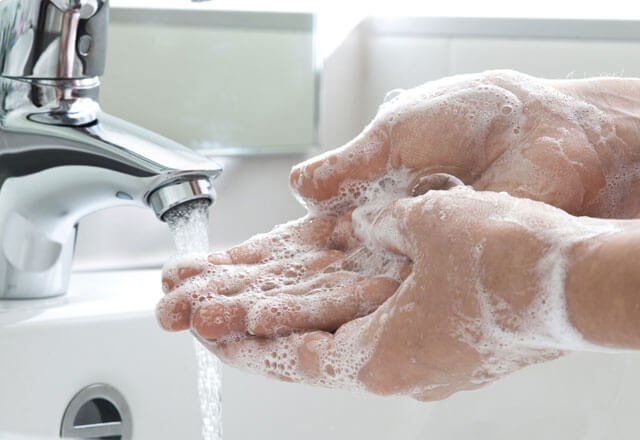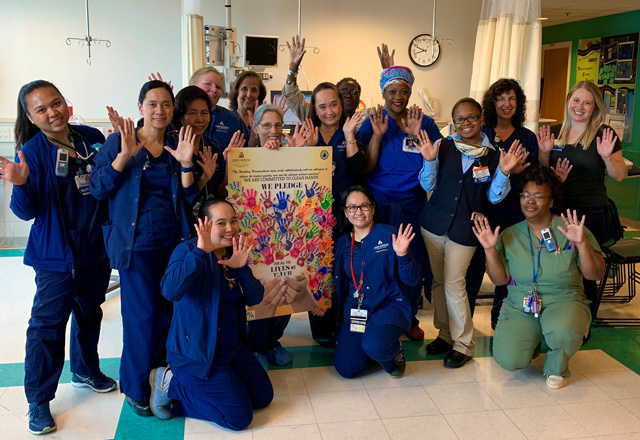Hand Hygiene
Good hand hygiene—washing hands or using a hand sanitizing gel—is the number one way to prevent the spread of germs. Health care workers should wash their hands before and after caring for each patient. It is important for patients, families and visitors to also practice good hand hygiene.
What is this measure?

Hand hygiene is a top priority at Johns Hopkins Medicine. Hand hygiene means cleaning your hands by either washing them with soap and water, or by using a hand sanitizing gel. Hand hygiene is the number one way to prevent the spread of germs and to prevent infections.
People who are experts in stopping infections work with health care providers, patients and families to make sure that they always keep their hands clean. This helps prevent the spread of viruses and bacteria that cause colds, flu and other infections.
At Johns Hopkins Medicine, some employees are trained to watch how well medical staff keep their hands clean. They observe doctors, nurses and other health care workers to see if they wash their hands or use antibacterial gel before entering or leaving a patient’s room.
Johns Hopkins Medicine takes hand hygiene very seriously. More than 65,000 hand hygiene observations are monitored each year. This information is shared with hospital staff and leadership. The information is used to help to continually improve hand hygiene in our health system so that we can provide the safest and best care to all of our patients.
Why is it important?
The Centers for Disease Control and Prevention (CDC) says washing hands is one of the most effective ways to prevent the spread of diseases and infections. Germs can live on surfaces for hours and are often passed from person to person through physical contact.
Health care workers come in contact with patients, equipment and other items in patient rooms. In the hospital, there are many opportunities for hand hygiene to help keep our patients safe. Ensuring doctors, nurses and other staff have clean hands is critical to prevent the spread of illness.
The Joint Commission, a health care accreditation organization, says direct observation of staff hand hygiene is the most effective and accurate way to measure hand hygiene compliance.
What is Johns Hopkins Medicine doing to continue to improve?
Johns Hopkins Medicine strives for 100 percent hand hygiene compliance for all health care workers.
Awareness and Education Campaigns
Regardless of job role, every employee of Johns Hopkins Medicine must practice good hand hygiene to protect our patients, visitors, colleagues, and friends.
Posters and signs are placed around the hospital as reminders for health care workers, patients, and visitors to wash their hands or use a sanitizing gel. Staff and patients are also encouraged to speak up if they notice someone forgot to wash their hands.
Johns Hopkins Medicine also educates staff that may not have direct patient contact but still play a vital role in infection prevention through good hand hygiene.
Keeping Staff Accountable
We continually use signs and education to remind staff of the importance of hand hygiene. All staff are encouraged to speak up if they see someone who has forgotten to wash their hands.
Every Johns Hopkins Medicine hospital also has employee recognition programs for staff members and units excelling at consistently practicing good hand hygiene. Many of our facilities also have programs in place for direct feedback and coaching for staff members who were observed forgetting to perform hand hygiene.
Frontline Perspective
 The Weinburg PACU staff members are committed to hand hygiene for all the lives they touch.
The Weinburg PACU staff members are committed to hand hygiene for all the lives they touch.Amaryllis “Mae” Ortega, R.N. II
Weinberg Post-Anesthesia Care Unit (PACU)
“I am one of the bedside nurses in the Weinberg PACU. I care for patients with compromised immune systems who are getting chemotherapy or having surgery. It is my job, and the job of the other nurses, to keep our patients safe, free from harm and free from infection.
Our team knows that clean hands save lives. In the center of our unit, we have a pledge board for hand hygiene, where we all have added our names. Everyone signs it as a promise to keep safe all the patients we touch.
We all share the same goal: to look out for the safety of our patients. We actively remind one another to perform proper hand hygiene with proper hand-washing or hand-rub techniques while caring for patients.
The best part about my job is that I touch people’s lives. I am happy to be part of a team committed to practicing proper hand hygiene, keeping patients safe, eliminating infections and preventing harm.”
How can patients and families support safety?
Patients and families are encouraged in the patient handbook to speak up and ask health care providers if they washed their hands prior to entering the patient room.
Patients and visitors should wash their own hands often, including before eating, after using the restroom and after touching any surface in the hospital room. Visitors should also follow any additional infection control measures, such as wearing an isolation gown, put in place by the health care team.
For more information
Quality and Safety Performance During COVID-19
The organization’s quality and safety performance may have been impacted by the COVID-19 pandemic. We would urge patients to consider more recent performance in combination with historical performance. Patients may benefit from discussing with their healthcare provider the disruptions COVID-19 may have caused on quality and safety of care.
See how Johns Hopkins Medicine prioritizes safety during the COVID-19 pandemic.
